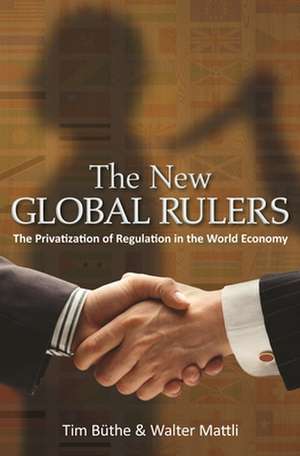The New Global Rulers – The Privatization of Regulation in the World Economy
Autor Tim Büthe, Walter Mattlien Limba Engleză Paperback – 13 iun 2013
"In a world where global standards increasingly determine access to world markets, understanding how those standards are set is of vital concern to citizens, governments, and firms. This deeply informed book asks the questions and presents the often counterintuitive facts about the relation between domestic interests and global rule making that will set the intellectual agenda and shape political discussion in this area for years to come."--Charles Sabel, Columbia Law School
"Tim Büthe and Walter Mattli say something new and important about the world economy. Better yet, they prove their case. As economic interdependence grows and with it the need for clear global rules, more and more of those rules are being developed by private regulatory groups. Büthe and Mattli not only document this shift, they show how inherently political the process is."--Charles Lipson, University of Chicago
"Büthe and Mattli's survey of hundreds of senior financial managers is a window into a world most of us have observed only anecdotally. This impressive book convincingly reveals that the global regulatory advantage goes to those actors who can get useful information into the right hands at the right time. Bravo on a compelling story about how private firms, industry organizations, and local regulators contribute to the global governance of finance and production."--Beth Simmons, Harvard University
"When you buy an electrical appliance or rely on corporate accounts, you are affected by transnational private regulation--a technical arena that is also highly political. In The New Global Rulers, Tim Büthe and Walter Mattli brilliantly explain who wins, and who governs, in this significant but under-studied domain."--Robert O. Keohane, Princeton University
"Analytically powerful. Both the empirical material and the theoretical analysis are significant contributions, and I think they will be quite influential. The book's impact will be enhanced by its unusually clear writing and engaging discussions of history and examples. It is a very accessible volume, which should give it considerable crossover appeal beyond international-relations scholars."--Kenneth W. Abbott, Arizona State University
"The New Global Rulers covers a big topic--an important and growing one, with an ever-wider audience."--Peter A. Gourevitch, University of California, San Diego, and coauthor of Political Power and Corporate Control
Preț: 242.60 lei
Nou
46.43€ • 50.41$ • 38.100£
Carte tipărită la comandă
Livrare economică 23 aprilie-07 mai
Specificații
ISBN-10: 0691157979
Pagini: 320
Ilustrații: 22 illustrations
Dimensiuni: 155 x 233 x 23 mm
Greutate: 0.43 kg
Editura: Princeton University Press
Descriere
Over the past two decades, governments have delegated extensive regulatory authority to international private-sector organizations. This internationalization and privatization of rule making has been motivated not only by the economic benefits of common rules for global markets, but also by the realization that government regulators often lack the expertise and resources to deal with increasingly complex and urgent regulatory tasks. The New Global Rulers examines who writes the rules in international private organizations, as well as who wins, who loses--and why. Tim Buthe and Walter Mattli examine three powerful global private regulators: the International Accounting Standards Board, which develops financial reporting rules used by corporations in more than a hundred countries; and the International Organization for Standardization and the International Electrotechnical Commission, which account for 85 percent of all international product standards. Buthe and Mattli offer both a new framework for understanding global private regulation and detailed empirical analyses of such regulation based on multi-country, multi-industry business surveys. They find that global rule making by technical experts is highly political, and that even though rule making has shifted to the international level, domestic institutions remain crucial. Influence in this form of global private governance is not a function of the economic power of states, but of the ability of domestic standard-setters to provide timely information and speak with a single voice. Buthe and Mattli show how domestic institutions' abilities differ, particularly between the two main standardization players, the United States and Europe.



